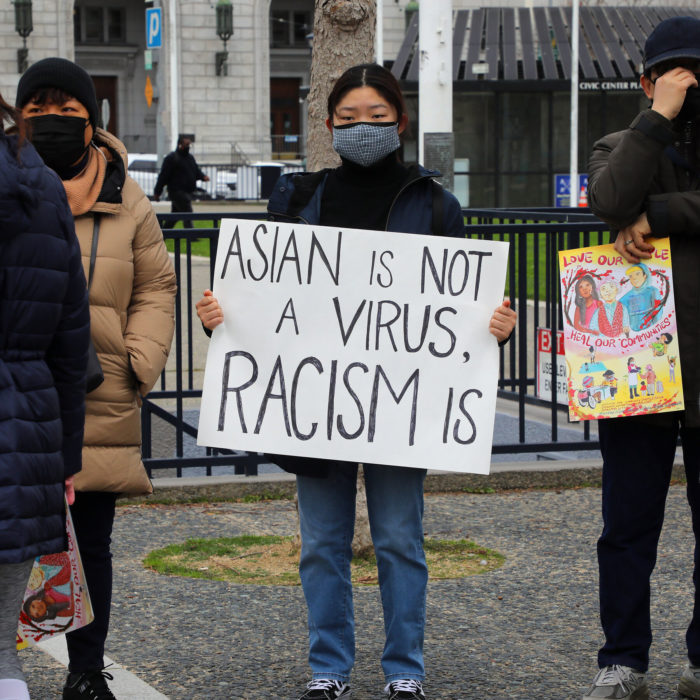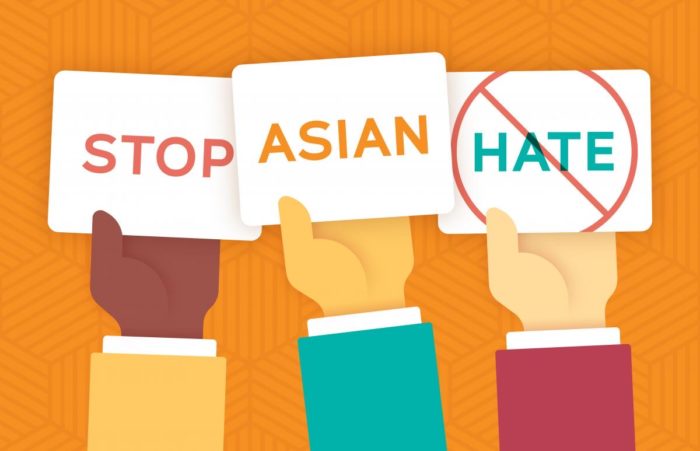The media and various forms of propaganda have always influenced people and the society at large. Xenophobic and derogatory behavior towards Asian Americans has gotten increasingly worse over the past few years, especially in politics and on social media. Asian Americans are suddenly being terrorized by Americans of all ages, ethnicities, genders, cultures, and beliefs. Americans looking to scapegoat Asian citizens are continuously blaming Asian-Americans for the pandemic, and thus believe they have the right to verbally and physically abuse Asian Americans’ human rights.
Social conformity plus explicit prejudice describe psychological syndromes that can be used to understand why anti-Asian American behavior persists in our society. Certain racist political and social sentiments encouraged over the past year have demonized Asian Americans, endangering their livelihoods and safety.
Asian Americans have endured many forms of verbal and physical abuse over this past year. Due to the first outbreak of the coronavirus in Wuhan, China, suspicion and hostility was directed at Asian Americans, leaving them in constant danger. Since then, there have been over “… 3000 firsthand accounts of discrimination, verbal aggression, shunning, spitting and other forms of assault against Asian Americans…” (Editorial Board, 2021). These hate crimes are committed as negative forms of public expression, meant to make Asian Americans feel unwelcome in the United States. They are also considered central to many of the social and economic problems Americans are facing due to COVID. Many of these attacks were triggered by our former President Donald J. Trump’s inflammatory remarks, such as calling COVID-19 the “Chinese virus” and “Kung Flu.” Trump continued to indulge his own and his supporter’s xenophobic attitudes and behavior over social media and during his press conferences.
Now that the United States begins to return to some sort of normalcy thanks to its economy and businesses starting to thrive again, Asian American business owners are suffering the most. According to an article in the Washington Post, “… Amid heightened fears, business owners have begun hiring their own security, buying guns, and cutting their hours of operation as well as advertising, among other costly safety measures that limit their profits — and profile — at a time when businesses are already struggling…” (2021).
Many psychological factors influence a person’s behavior, choices, and beliefs. Accordingly, what motivates many of the actions of those who are anti-Asian is the compulsive habit of social conformity. Conformity is a social practice where a person or a group of people change their ideas, beliefs, values, behavior, and opinions to match what they think is the dominant cultural norm. There is also the phenomenon of informational social influence which is, “… when we rely on others as a source of information to guide our behavior” (Velez). This is an ideology that has led many people to conform to the notion that Asian Americans are the cause and source of the COVID-19. Remarks on social media by Donald Trump and many Republicans on the coronavirus have led to many negative social and political consequences. The Texas Tribune acknowledges that “The renaming will have broader meanings and implications for Asians and Asian Americans in the country and around the globe. …[T]his gesture will fuel a new wave of crimes and stigmatizes the entire racial group … [I]f the virus has already been named by the [World Health Organization] as COVID-19, any renaming is highly politically charged and motivated…” (Samuels, 2020)
The article goes on to say that: “Using that language lowers people’s perception of how widespread this could be. It helps people think, ‘If I’m not Chinese or I’m not Asian, then I can’t catch it.” (Samuels, 2020) When it comes to many hate crimes against Asian Americans, there are many psychological reasons why offenders target a specific person or group of people. According to Shanmugasundaram: “… sociologists Jack McDevitt and Jack Levin classified hate offenders as having four main motivations: thrill-seeking, defensive, retaliatory and mission… ” he goes on to say, “Defensive” hate crimes (25%) are committed by perpetrators who rationalize their attacks by identifying some sort of threat to themselves, their identities or their community” (2016). Most anti-Asian agitators conform to xenophobic behavior as a defense mechanism, believing Asian Americans are a threat to themselves and their family’s health and safety. The urge towards conformity impacts our actions and the decisions we make, but the environment too played a significant role in rising hate crimes and aggression against Asian Americans.
“Situationism” plays a crucial role in how people interact with each other. Situationism is when one’s environment and surroundings firmly reinforce specific behaviors and actions. Recent studies show that “… hate crimes are more likely to occur… in… an environment where perpetrators feel a sense of impunity when victimizing certain minority group members.” (Walters, Brown, Wiedlitzka, 2016). In a recent attack, an 89- year old woman in Brooklyn, New York, was walking alone when, “…two men never spoke a word to her as they slapped her in the face and then set her clothes on fire …” (Eyewitness News, 2020).
In yet another attack, a 91-year-old man in Oakland, California was forcefully pushed to the ground by an offender who some time earlier had shoved two other senior citizens. This hate crime was similar to a number of attacks on Asian Americans that predominantly target the elderly, and have occurred in New York, California, and Texas. Attackers are often emboldened by the vulnerability of older victims, Asians who are seniors are targeted when they are alone with no friends or family members to defend them. While different environments can lead to changes in one’s behavior, everyone has a different reaction depending on their previous beliefs.
“Explicit prejudice” is disapproval of a specific social or ethnic group, and is typically an ideology that is consciously held, even if it is not publicly stated. These Asian American attacks are hate crimes that are “… an extreme form of prejudice, made more likely in the context of social and political change” (APA, 2017). Asian Americans have had a long history of discrimination and explicit prejudice in the USA regarding employment, economic opportunities, educational opportunities, and physical and mental health resources. To make things worse, Asian Americans are still portrayed in a somewhat stereotypical light by the media.
Superficial stereotypes that idealize Asian Americans as a “model” minority group in due to their consistent hard work, compliance with social norms, and high academic achievement, are dangerous when applied to minorities who still suffer racist oppression in a country not always willing to support or understand them. Another problem is , “… the “perpetual foreigner” stereotype, which casts Asian Americans as fundamentally foreign individuals who will never fully assimilate into American society” (Abrams, 2019). This assumption was emphasized in a recent attack on an elderly Asian American woman, where the offender “…shouted a curse and anti-Asian slurs and told her, “You don’t belong here” before casually walking away as onlookers watched…” (Sisak).
This attitude is frequently the cause of political animosity towards Asian Americans, since many believe China is trying to take over and become a major “…threat to a nation that promoted a whites-only immigration policy” (Nation, 2020). These paranoid sentiments fuel the explicit prejudice some Americans have against citizens of Asian extraction. This race-based sense of permanent international competition led Donald Trump, other Republicans, and many people on social media to believe it was okay to rename the coronavirus the “Chinese Virus.” Overall, explicit prejudice remains the leading cause of the conflict between Asian Americans and their bigoted detractors… a prejudice which has only intensified since the arrival of COVID-19.
In short, Asian Americans find themselves in increasing danger due to pervasive psychological factors known as conformity, situationism, and explicit prejudice. As the number of hate crimes against Asian Americans continues to rise due to the COVID-19 pandemic, lawmakers and communities need a better understanding of not just the political but the psychological motives that motivate the offenders involved in random assaults. Although the number of COVID-19 cases is decreasing, there is still a widespread pandemic going on. Consequently, due to how this coronavirus pandemic was handled initially, the stigma unfairly attached to Asian Americans will be hard to erase due to how powerful social conditioning can manipulate one’s mindset, and actions. Maybe if the beginning of the COVID-19 pandemic had been handled better by our government, then Asian Americans would not be in the difficult position they now occupy.

